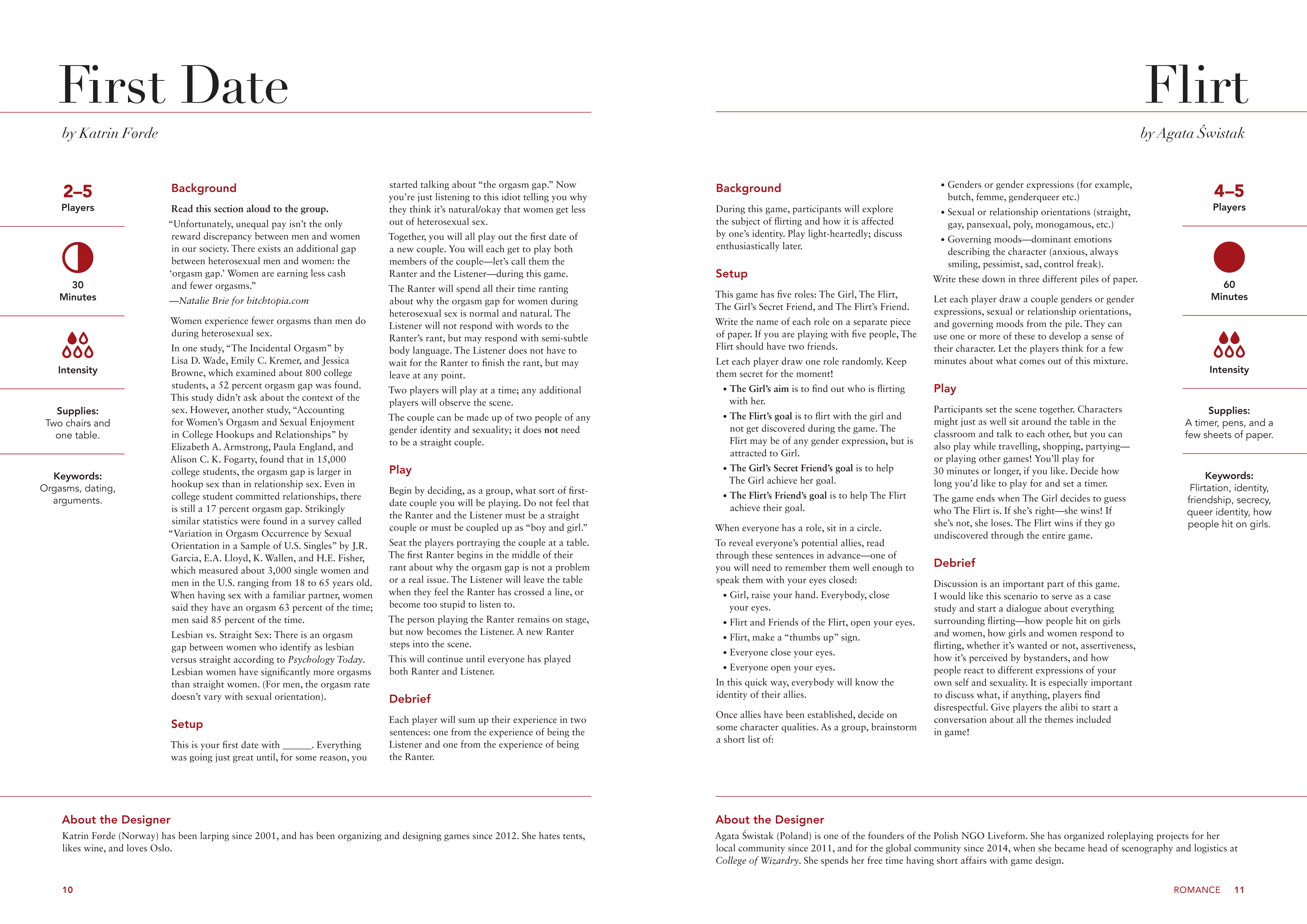Pelgrane Press, known for its narrative games like Hillfolk and its collection of story-games, Seven Wonders, is releasing an anthology of 34 mini-RPGs written by feminist authors from 11 different countries. These "nano-games", collected in the book #Feminism, are typically playable in under an hour, making them ideal for one-shots. Pelgrane has kindly sent along some previews of the book, which you can see below. With games like Mentioning the Unmentionables by Sweden's Kajsa Greger ("Three games about the anatomy of women: "Dances With Vulvas", "Dying for a Cup of Coffee", and "Just Put Some Salt on It"), Shoutdown to Launch by America's Jason Morningstar ("In this game about gendered interruption, a bunch of engineers need to fix a problem with a rocket engine in the dwindling time before launch. It won’t go well."), 6016 by Norway's Elin Nilsen ("In 6016 the only historical source of the 21st century is a collection of clips from the soap opera Love, Lust and Lack of Trust."), and First Joyful Mystery by Ireland's Cathriona Tobin ("Players examine the impact Ireland’s prohibitive abortion laws have on people who find themselves pregnant."), each game has an intensity rating from 1-5.
#Feminism is a 96-page softcover available for pre-order; those who do so get the PDF version immediately.
One of the anthology's writers, Emily Care Boss, spoke about her thoughts when writing Ma, Can I Help You With That?, which came out of her own process of aging and seeing others supporting their parents. The game investigated the was relationships become strained, and how men and women tend to interact with the process. Jason Morningstar, who wrote Shoutdown to Launch, talks about how his job in academia helped highlight some of the gender ratios and power dynamics, while quietly honouring engineers like Katherine Johnson and Galina Balashova.
With 34 different nano-games, a whole range of subjects are covered. Tour of Duty by Moyra Turkington looks at women in the US military; Her Last Tweet deals with a campus shooting event; and in President, the goal of the game is to draft the first female president of the Akhaian Empire's press statement. There's a full list of the games below the images below!




First Date Katrin Førde
A game about a date gone wrong and a rant about the orgasm gap.
Flirt Agata Swistak
Flirt is an attempt to deconstruct the game almost everyone is playing — the game of hook-ups, crushes, and scoring!
Spin the Goddesses Karin Edman
A kissing game of lesbian witches.
Willful Disregard Anna Westerling
A love story.
Manic Pixie Dream Girl Commandos Lizzie Stark
A military unit undertakes its last whimsical mission before retiring to civilian life.
6016 Elin Nilsen
In 6016 the only historical source of the 21st century is a collection of clips from the soap opera Love, Lust and Lack of Trust.
Tropes vs. Women Ann Eriksen
Explore well-known movie clichés and tropes about women in a fun and not too serious way.
Lipstick Kaisa Kangas
Sofia hesitates about whether to wear lipstick to a TV debate on feminism.
You’ve Come a Long Way, Baby Julia Ellingboe
A game about gender, cultural, and ethnic representation in the movies.
Restrictions Frida Karlsson Lindgren and Sofia Stenler
A non-verbal game on how we are and aren’t allowed to move together, as two genders.
Mentioning the Unmentionables Kajsa Greger
Three games about the anatomy of women.
#Flesh Frederik Berg, Rebecka Eriksson, and Tobias Wrigstad
A physical game about the objectification of women or how women’s bodies are butchered into parts.
Selfie Kira Magrann
An intimate game about feelings in images.
So Mom I Made This Sex Tape Susanne Vejdemo
Different generations of feminists argue it out about sex, porn, and what the main point of feminism really is.
My Sister, Malala Elsa Helin
A game about freedom of thoughts and ideas for girls in Pakistan.
A Friend in Need Muriel Algayres
A nano-game about street harassment, victim-blaming and friendship. After a bad encounter on the street, can Ella get over victim-blaming with the help of her friends?
Driving to Reunion Laura Simpson
An intergenerational game about four Black women trying to understand each other, as they drive back for college reunion.
Catcalling Tora de Boer
Street harassment feels different depending on whether bystanders support the harasser or the victim.
How to Be Ava White Eva Wei
At a board meeting, parts of Ava White’s personality decide how to make her the perfect woman.
Shoutdown to Launch Jason Morningstar
In this game about gendered interruption, a bunch of engineers need to fix a problem with a rocket engine in the dwindling time before launch. It won’t go well.
“Something to Drink with That, Sir?” Evan Torner
A woman flight attendant performs emotional labor to serve three different male passengers.
“Ma, Can I Help You with That?” Emily Care Boss
A game about family, age and the gendered nature of care-giving.
Glitzy Nails Kat Jones
A freeform scenario about intersectional feminism, interactions between women, and nail salons.
Stripped Dominika Kovacova
A game about stripping off the stigma.
President Kaisa Kangas
The war-waging Akhaian empire has elected its first female president, a very successful lady general, and feminists with conflicting agendas are trying to draft a press statement together.
Curtain Call Sarah Bowman
A larp about the experiences of a woman in the music industry over the course of four decades.
The Grey Zone Siri Sandquist
A larp about the grey zone between rape and consensual sex in a relationship.
Family Planning Clinic Baptiste Cazes and Leïla Teteau-Surel with Laura Guedes
A game about women’s health where players will play short scenes from the daily life of a French family planning clinic inspired by real stories.
First Joyful Mystery Cathriona Tobin
Players examine the impact Ireland’s prohibitive abortion laws have on people who find themselves pregnant.
Girl: A Game for Boys Livia von Sucro
A small exercise about empathy, designed for cis gendered men to take a glimpse of what it feels like to be a victim of violence against women.
Her Last Tweet Rowan Cota
A microgame exploring being a potential victim of a campus shooting event.
Tour of Duty Moyra Turkington
A freeform nano-scenario about what it’s like to serve and defend as a woman in the US Military.
#Feminism is a 96-page softcover available for pre-order; those who do so get the PDF version immediately.
One of the anthology's writers, Emily Care Boss, spoke about her thoughts when writing Ma, Can I Help You With That?, which came out of her own process of aging and seeing others supporting their parents. The game investigated the was relationships become strained, and how men and women tend to interact with the process. Jason Morningstar, who wrote Shoutdown to Launch, talks about how his job in academia helped highlight some of the gender ratios and power dynamics, while quietly honouring engineers like Katherine Johnson and Galina Balashova.
With 34 different nano-games, a whole range of subjects are covered. Tour of Duty by Moyra Turkington looks at women in the US military; Her Last Tweet deals with a campus shooting event; and in President, the goal of the game is to draft the first female president of the Akhaian Empire's press statement. There's a full list of the games below the images below!
First Date Katrin Førde
A game about a date gone wrong and a rant about the orgasm gap.
Flirt Agata Swistak
Flirt is an attempt to deconstruct the game almost everyone is playing — the game of hook-ups, crushes, and scoring!
Spin the Goddesses Karin Edman
A kissing game of lesbian witches.
Willful Disregard Anna Westerling
A love story.
Manic Pixie Dream Girl Commandos Lizzie Stark
A military unit undertakes its last whimsical mission before retiring to civilian life.
6016 Elin Nilsen
In 6016 the only historical source of the 21st century is a collection of clips from the soap opera Love, Lust and Lack of Trust.
Tropes vs. Women Ann Eriksen
Explore well-known movie clichés and tropes about women in a fun and not too serious way.
Lipstick Kaisa Kangas
Sofia hesitates about whether to wear lipstick to a TV debate on feminism.
You’ve Come a Long Way, Baby Julia Ellingboe
A game about gender, cultural, and ethnic representation in the movies.
Restrictions Frida Karlsson Lindgren and Sofia Stenler
A non-verbal game on how we are and aren’t allowed to move together, as two genders.
Mentioning the Unmentionables Kajsa Greger
Three games about the anatomy of women.
#Flesh Frederik Berg, Rebecka Eriksson, and Tobias Wrigstad
A physical game about the objectification of women or how women’s bodies are butchered into parts.
Selfie Kira Magrann
An intimate game about feelings in images.
So Mom I Made This Sex Tape Susanne Vejdemo
Different generations of feminists argue it out about sex, porn, and what the main point of feminism really is.
My Sister, Malala Elsa Helin
A game about freedom of thoughts and ideas for girls in Pakistan.
A Friend in Need Muriel Algayres
A nano-game about street harassment, victim-blaming and friendship. After a bad encounter on the street, can Ella get over victim-blaming with the help of her friends?
Driving to Reunion Laura Simpson
An intergenerational game about four Black women trying to understand each other, as they drive back for college reunion.
Catcalling Tora de Boer
Street harassment feels different depending on whether bystanders support the harasser or the victim.
How to Be Ava White Eva Wei
At a board meeting, parts of Ava White’s personality decide how to make her the perfect woman.
Shoutdown to Launch Jason Morningstar
In this game about gendered interruption, a bunch of engineers need to fix a problem with a rocket engine in the dwindling time before launch. It won’t go well.
“Something to Drink with That, Sir?” Evan Torner
A woman flight attendant performs emotional labor to serve three different male passengers.
“Ma, Can I Help You with That?” Emily Care Boss
A game about family, age and the gendered nature of care-giving.
Glitzy Nails Kat Jones
A freeform scenario about intersectional feminism, interactions between women, and nail salons.
Stripped Dominika Kovacova
A game about stripping off the stigma.
President Kaisa Kangas
The war-waging Akhaian empire has elected its first female president, a very successful lady general, and feminists with conflicting agendas are trying to draft a press statement together.
Curtain Call Sarah Bowman
A larp about the experiences of a woman in the music industry over the course of four decades.
The Grey Zone Siri Sandquist
A larp about the grey zone between rape and consensual sex in a relationship.
Family Planning Clinic Baptiste Cazes and Leïla Teteau-Surel with Laura Guedes
A game about women’s health where players will play short scenes from the daily life of a French family planning clinic inspired by real stories.
First Joyful Mystery Cathriona Tobin
Players examine the impact Ireland’s prohibitive abortion laws have on people who find themselves pregnant.
Girl: A Game for Boys Livia von Sucro
A small exercise about empathy, designed for cis gendered men to take a glimpse of what it feels like to be a victim of violence against women.
Her Last Tweet Rowan Cota
A microgame exploring being a potential victim of a campus shooting event.
Tour of Duty Moyra Turkington
A freeform nano-scenario about what it’s like to serve and defend as a woman in the US Military.
SaveSave
SaveSave
SaveSave

